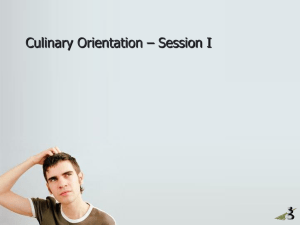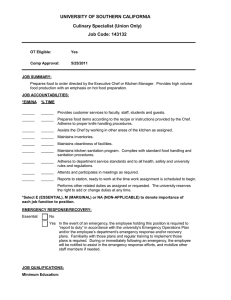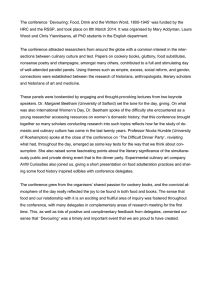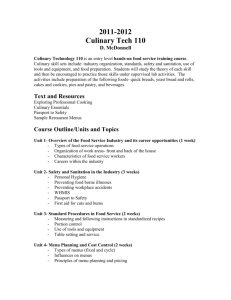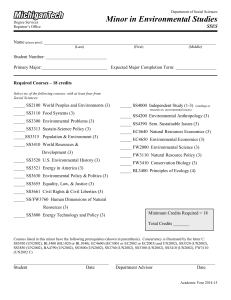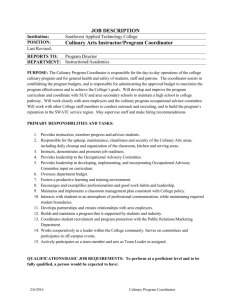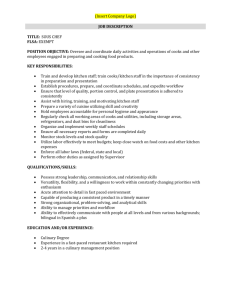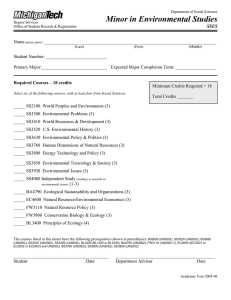CUUL - Culinary Arts CUUL 1320 - Garde Manger
advertisement
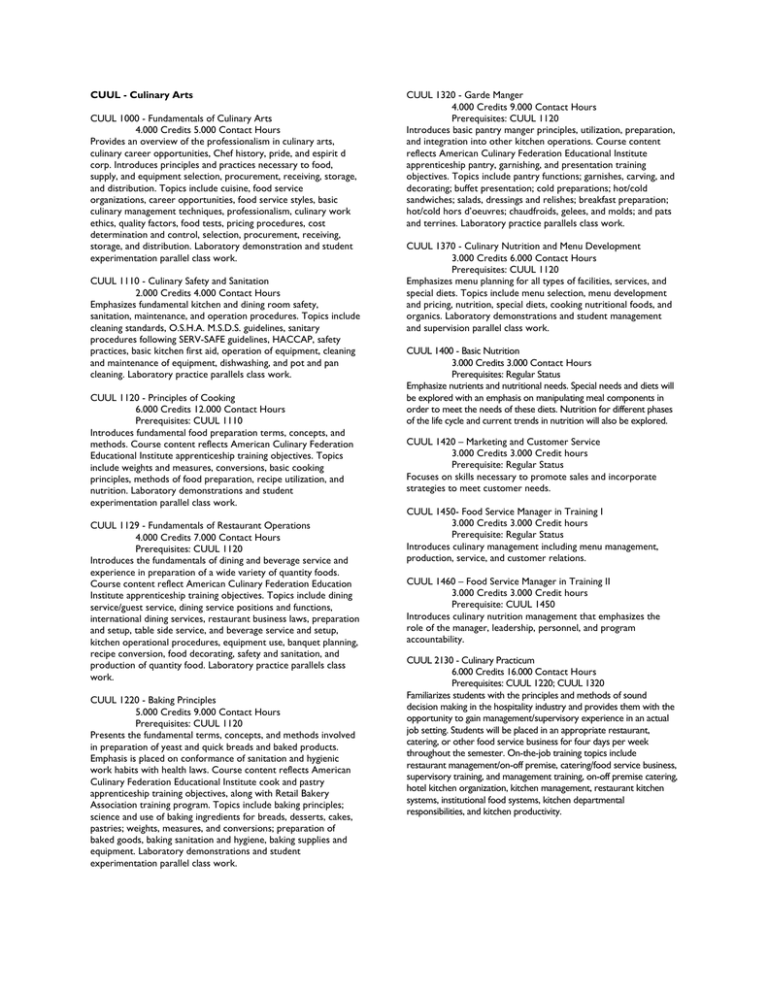
CUUL - Culinary Arts CUUL 1000 - Fundamentals of Culinary Arts 4.000 Credits 5.000 Contact Hours Provides an overview of the professionalism in culinary arts, culinary career opportunities, Chef history, pride, and espirit d corp. Introduces principles and practices necessary to food, supply, and equipment selection, procurement, receiving, storage, and distribution. Topics include cuisine, food service organizations, career opportunities, food service styles, basic culinary management techniques, professionalism, culinary work ethics, quality factors, food tests, pricing procedures, cost determination and control, selection, procurement, receiving, storage, and distribution. Laboratory demonstration and student experimentation parallel class work. CUUL 1110 - Culinary Safety and Sanitation 2.000 Credits 4.000 Contact Hours Emphasizes fundamental kitchen and dining room safety, sanitation, maintenance, and operation procedures. Topics include cleaning standards, O.S.H.A. M.S.D.S. guidelines, sanitary procedures following SERV-SAFE guidelines, HACCAP, safety practices, basic kitchen first aid, operation of equipment, cleaning and maintenance of equipment, dishwashing, and pot and pan cleaning. Laboratory practice parallels class work. CUUL 1120 - Principles of Cooking 6.000 Credits 12.000 Contact Hours Prerequisites: CUUL 1110 Introduces fundamental food preparation terms, concepts, and methods. Course content reflects American Culinary Federation Educational Institute apprenticeship training objectives. Topics include weights and measures, conversions, basic cooking principles, methods of food preparation, recipe utilization, and nutrition. Laboratory demonstrations and student experimentation parallel class work. CUUL 1129 - Fundamentals of Restaurant Operations 4.000 Credits 7.000 Contact Hours Prerequisites: CUUL 1120 Introduces the fundamentals of dining and beverage service and experience in preparation of a wide variety of quantity foods. Course content reflect American Culinary Federation Education Institute apprenticeship training objectives. Topics include dining service/guest service, dining service positions and functions, international dining services, restaurant business laws, preparation and setup, table side service, and beverage service and setup, kitchen operational procedures, equipment use, banquet planning, recipe conversion, food decorating, safety and sanitation, and production of quantity food. Laboratory practice parallels class work. CUUL 1220 - Baking Principles 5.000 Credits 9.000 Contact Hours Prerequisites: CUUL 1120 Presents the fundamental terms, concepts, and methods involved in preparation of yeast and quick breads and baked products. Emphasis is placed on conformance of sanitation and hygienic work habits with health laws. Course content reflects American Culinary Federation Educational Institute cook and pastry apprenticeship training objectives, along with Retail Bakery Association training program. Topics include baking principles; science and use of baking ingredients for breads, desserts, cakes, pastries; weights, measures, and conversions; preparation of baked goods, baking sanitation and hygiene, baking supplies and equipment. Laboratory demonstrations and student experimentation parallel class work. CUUL 1320 - Garde Manger 4.000 Credits 9.000 Contact Hours Prerequisites: CUUL 1120 Introduces basic pantry manger principles, utilization, preparation, and integration into other kitchen operations. Course content reflects American Culinary Federation Educational Institute apprenticeship pantry, garnishing, and presentation training objectives. Topics include pantry functions; garnishes, carving, and decorating; buffet presentation; cold preparations; hot/cold sandwiches; salads, dressings and relishes; breakfast preparation; hot/cold hors d’oeuvres; chaudfroids, gelees, and molds; and pats and terrines. Laboratory practice parallels class work. CUUL 1370 - Culinary Nutrition and Menu Development 3.000 Credits 6.000 Contact Hours Prerequisites: CUUL 1120 Emphasizes menu planning for all types of facilities, services, and special diets. Topics include menu selection, menu development and pricing, nutrition, special diets, cooking nutritional foods, and organics. Laboratory demonstrations and student management and supervision parallel class work. CUUL 1400 - Basic Nutrition 3.000 Credits 3.000 Contact Hours Prerequisites: Regular Status Emphasize nutrients and nutritional needs. Special needs and diets will be explored with an emphasis on manipulating meal components in order to meet the needs of these diets. Nutrition for different phases of the life cycle and current trends in nutrition will also be explored. CUUL 1420 – Marketing and Customer Service 3.000 Credits 3.000 Credit hours Prerequisite: Regular Status Focuses on skills necessary to promote sales and incorporate strategies to meet customer needs. CUUL 1450- Food Service Manager in Training I 3.000 Credits 3.000 Credit hours Prerequisite: Regular Status Introduces culinary management including menu management, production, service, and customer relations. CUUL 1460 – Food Service Manager in Training II 3.000 Credits 3.000 Credit hours Prerequisite: CUUL 1450 Introduces culinary nutrition management that emphasizes the role of the manager, leadership, personnel, and program accountability. CUUL 2130 - Culinary Practicum 6.000 Credits 16.000 Contact Hours Prerequisites: CUUL 1220; CUUL 1320 Familiarizes students with the principles and methods of sound decision making in the hospitality industry and provides them with the opportunity to gain management/supervisory experience in an actual job setting. Students will be placed in an appropriate restaurant, catering, or other food service business for four days per week throughout the semester. On-the-job training topics include restaurant management/on-off premise, catering/food service business, supervisory training, and management training, on-off premise catering, hotel kitchen organization, kitchen management, restaurant kitchen systems, institutional food systems, kitchen departmental responsibilities, and kitchen productivity. CUUL 2140 - Advanced Baking and International Cuisine 6.000 Credits 12.000 Contact Hours Prerequisites: CUUL 1220; CUUL 1320 Introduces international cuisine and acquisition of advanced cookery techniques. Course content reflects American Culinary Federation Educational Institute cook apprenticeship training objectives and provides background for those aspiring to become chefs. Topics include international cuisine, advanced grill cookery, advanced vegetable cookery, advanced meat cookery, advanced line cookery, advanced fry cookery and nutrition. Laboratory practice parallels class work. Provides in-depth experience in preparing many types of baked goods commonly found in restaurants and hotels. Course content reflects American Culinary Federation and Retail Bakery Association training objectives and provides background for those aspiring to become pastry chefs or bakery supervisors. Topics include breads, pies, cakes, pastry dough, puff pastry, icing, filling, and candy. Laboratory practice parallels class work. CUUL 2160 - Contemporary Cuisine 4.000 Credits 9.000 Contact Hours Prerequisites: CUUL 1220; CUUL 1320 Emphasizes all modern cuisine and introduces management concepts necessary to the functioning of a commercial kitchen. Topics include international cuisine, cuisine trends, kitchen organization, kitchen management, kitchen supervision, competition entry, nutrition, menu selection, layout and design, and on/off premise catering. Laboratory demonstration and student experimentation parallel class work. CUUL 2190 – Principles of Culinary Leadership 3.000 Credits 3.000 Contact Familiarizes the student with principles, skills, methods, and behaviors necessary for sound leadership of people in their job responsibilities. Emphasis will be placed on real-life concepts, personal skill development, applied knowledge, and managing human resources. Course content is intended to help leaders, managers, and supervisors deal with a dramatically changing workplace that is affected by technology changes, a more competitive and global market place, corporate restructuring, and the changing nature of work and the workforce. Topics include leadership principles, leadership relative to the function of management; decision making process; building and effect organizational culture; human resource management; and delegating management, organization, and control. CUUL 2250 – Advanced Baking Principles 6.000 Credits 12.000 Contact Provides in-depth experience in preparing many types of baked goods found in restaurants, country clubs, and hotels. Course content reflects American Culinary Federation and Retail Bakery Association training objectives and provides background for those aspiring to become Executive Pastry Chefs, Working Pastry Chefs and Bakers. Topics include Artisan Breads, Tarts, Tortes, Pastry Dough, Puff Pastry, Icing (buttercreams and meringues), Filling (sauces and coulis), Sugar, Chocolates, and Confections. Laboratory practice parallels class work.
